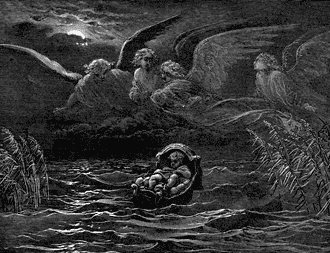Monday, September 18, 2006
Out of Egypt I Called My Son (Exodus 1-4)

Genesis ended with the sons of Jacob safe in Egypt. Though in Canaan they were often threatened with famine and hostile neighbors, here Joseph’s work and influence give their fledgling tribe a chance to flourish and multiply. If Israel is the Lord’s “firstborn son,” then Goshen in Egypt is the protective womb - keeping the vulnerable child safe while he grows strong enough to survive in the outside world.
The child is soon fully grown, and Israel can only get out of the womb by enduring the agony and danger of birth. The new Pharaoh, who never knew Joseph, is only too happy to dish out the labor. But the pain of slavery isn’t enough, and Pharaoh makes the infamous order to throw all the Hebrew baby boys into the river.
Baby Moses survives the ordeal, floating atop the water in the basket his mother made, and lands in the merciful arms of Pharaoh’s daughter. Upon growing up, Moses runs into an Egyptian beating a Hebrew. Moved with pity, he kills the attacker, and is then forced to flee the country.
It’s here that Moses runs into the Lord speaking from the burning bush. God has remembered his covenant with Israel, and is gearing up to bring them out of Egypt and into Canaan. And what better man to lead them than Moses - a man so compassionate toward the stricken people that he compromised his own privileged position to bring relief to a beaten slave?
The problem is that Moses isn’t interested! What follows is a cringe-inducing exchange, with Moses offering one excuse after another to try to get out of God’s call (each one more pathetic than the last):
Who am I that I should go to Pharaoh and bring the children of Israel out of Egypt?God is noticeably irritated with Moses’ whining. His retort is profound and devastating:
If I come to the people of Israel and say to them, ‘The God of your fathers has sent me to you,’ and they ask me, ‘What is his name?’ what shall I say to them?
But behold, they will not believe me or listen to my voice, for they will say, ‘The Lord did not appear to you.’
Oh, my Lord, I am not eloquent, either in the past or since you have spoken to your servant, but I am slow of speech and of tongue.
Who has made man's mouth? Who makes him mute, or deaf, or seeing, or blind? Is it not I, the Lord? Now therefore go, and I will be with your mouth and teach you what you shall speak.To which Moses simply resorts to begging “please send someone else!” This time the Lord is furious, and rightly so! Yet, amazingly, he condescends to negociate with Moses. In the end Moses gets God’s name, an arsenal of miracles, and Aaron as a spokesman.
Why does the Lord put up with this nonsense? Why choose someone like Moses, a man reluctant enough to argue with God? It reminds me a little of Abraham at Sodom and Jacob wrestling with God. The Lord seems to prefer men who have the spunk to spar with him. And a good thing too! The people will need someone willing to argue on their behalf soon enough.
Comments:
<< Home
This makes me think of the human vessel God prepares, even from birth, for the mission and calling he gives them. Of course this preparation goes on right up to the time of the work to be done.
Sparring here, would be a sign of faith. Faith means taking God at his Word, but doing so can involve a struggle, and certainly will always involve more faith. Some personalities are much more prone to spar than others. Maybe leadership kinds; I don't know, but I'd guess, in general, yes.
Thanks.
Post a Comment
Sparring here, would be a sign of faith. Faith means taking God at his Word, but doing so can involve a struggle, and certainly will always involve more faith. Some personalities are much more prone to spar than others. Maybe leadership kinds; I don't know, but I'd guess, in general, yes.
Thanks.
<< Home
Home
Who is Oyarsa?
Contact Me
Blog the Bible
Recent Comments
Archives
- June 2006
- July 2006
- August 2006
- September 2006
- October 2006
- November 2006
- December 2006
- January 2007
- February 2007
- March 2007
- April 2007
- May 2007
- June 2007
- July 2007
- August 2007
- September 2007
- October 2007
- November 2007
- December 2007
- January 2008
- February 2008
- March 2008
- April 2008
- May 2008
- June 2008
- July 2008
- September 2008
- October 2008
- November 2008
- July 2009
- August 2009
- January 2010
- August 2010
Recommended Books
